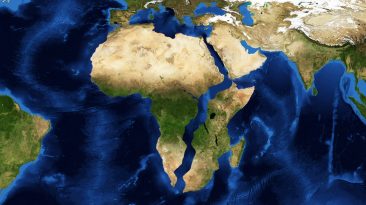Twin siblings, twin peaks, twin cities, twin planets… Two earths, one solar system.
How would that work? Where would it have to be located? Can two planets share an orbit?
Would people on another Earth be the same as us? Would we be in touch?
In 2015, NASA’s super powerful Kepler Space Telescope discovered the closest copy of Earth to date. It’s called Kepler-452.
Often nicknamed “Earth 2.0,” Kepler-452 orbits a star about the same size as our Sun every 385 days. Earth 2.0 is positioned within a habitable zone relative to it’s star, meaning it’s not too hot and not too cold, and it’s likely to have a rocky surface too.
While this planet could plausibly be a cousin to Earth, it’s about 1,400 light-years away from our Solar System…
But suppose we had a second Earth in our Solar System.
Two identical Earths, with perhaps the only difference exisiting between their respective inhabitants. How long would this scenario last? Is it gravity or a rival species we need to fear most?
If we’re going to fit another Earth anywhere in our Solar System, our best bet is somewhere between our planet and Mars. Our Earth is on the inner edge of the Solar System’s habitable zone, and with Mars closer to the outer edge, anything past it might be a little too cold for a species like ours.
Let’s imagine another Earth that’s close enough to our own so that its inhabitants are comfortable. Is this a stable situation?
That would depend on your definition of stable. The prospect of two planets sharing the same orbit is possible, but it wouldn’t last forever.
Eventually, the gravitational interaction between both planets would either cause the two of them to collide; or one would end up pushing the other one towards the Sun, and we’d be back to just one Earth. But don’t let that scare you, it’s possible that two planets could co-orbit in harmony for billions of years before anything bad happened.
[dx_custom_adunit desktop_id=”RTK_CDE4″ mobile_id=”RTK_SUFd”]Another possibility is a binary planet system, in which two Earths of comparable size could have separate orbits, with one orbiting outside of the other. Think of the Moon, the Earth, and the Sun.
See how the Moon orbits the Earth, but how they both end up going around the Sun? But since we’re talking about two planets of similar size and gravitational attraction, it’s more likely that these two Earths would swap positions. We’ve already got a real life example of this with two of Saturn’s moons, Epimetheus and Janus.
About every four years, whichever moon is closer to Saturn has a shorter orbital period and catches up to its cousin. As they get closer, the two moons pull on eachother, causing one to slow down and the other to speed up.
The one on the inside gains speed and moves out, the one on the outside loses speed and falls closer to Saturn. But then, of course, the closer moon to Saturn adopts a shorter orbital period, speeds up, and overtakes its cousin in about another four years. But while we’ve seen moons do this, we’ve yet to discover a binary planet system.
Let’s just suppose that’s how it works: two Earths either sharing an orbit or swapping between two. Now, assuming that this second Earth is inhabited by intelligent lifeforms, and that they’ve evolved at relatively the same speed as our own human species, how would we interact with one other?
It’s impossible to say whether we’d look the same, or act the same, or even speak the same language! Twin planets don’t necessarily mean twin species.
But before we start dreaming up intergalactic trade or warfare, maybe we could start with something a little simpler. Maybe we start by trying to learn from each other, establishing communication through radio waves or satellites.
If they speak the same language, perhaps a friendly visit wouldn’t be too far off; and if not, it’d be quite the learning curve. But we’d get there.
Think about it, we put a man on the moon in the ’60s, and we’ve accomplished a lot more since! Will you visit another Earth in your lifetime? Nope.
Subscribe to What-If on Youtube or follow the show on Facebook Watch.
Sources
- What Would The Consequences Be If There Was A Planet Other Than Earth, Venus, Or Mars That Was In The Habitable Zone?”. Michael Richardson. 2015. Worldbuilding Stack Exchange. Accessed January 31 2019.
- “Earth Is Closer To The Edge Of Sun’s Habitable Zone – Physics World”. 2013. Physics World. Accessed January 31 2019.
- “Finding Another Earth”. 2019. NASA. Accessed January 31 2019.
- “Kepler-452B”. 2019. en.wikipedia.org. Accessed January 31 2019.
- “Kepler Space Telescope: The Original Exoplanet Hunter”. space.com. Accessed January 31 2019.
- “Facts About New Second Earth Planet Kepler 452 B”. 2019. Youtube. Accessed January 31 2019. .
- “Two Planets Found Sharing One Orbit”. Chown, Marcus. 2019 New Scientist. Accessed January 31 2019.
- “Ask Ethan: Can Two Planets Share The Same Orbit?”. Siegal, Ethan, 2015. forbes.com. Accessed January 31 2019.




























Sir, Don’t you have your own app? Obviously you must have.